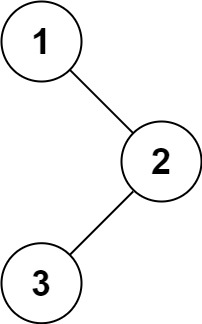4 KiB
Leetcode Binary-Tree-Preorder-Traversal
2022-07-04 14:51
Algorithms:
#algorithm #DFS #DFS_preorder #Morris_traversal
Data structures:
#DS #binary_tree
Difficulty:
#coding_problem #difficulty-easy
Additional tags:
#leetcode #CS_list_need_understanding
Revisions:
N/A
Related topics:
Links:
Problem
Given the root of a binary tree, return the preorder traversal of its nodes' values.
Examples
Example 1:
Input: root = [1,null,2,3] Output: [1,2,3]
Example 2:
Input: root = [] Output: []
Example 3:
Input: root = [1] Output: [1]
Constraints
- The number of nodes in the tree is in the range
[0, 100]. -100 <= Node.val <= 100
Thoughts
[!summary] This is a #binary_tree #DFS_preorder problem.
Preorder, means root is at the "Pre" position, so the order is:
- Search root node
- Search left sub-tree
- Search right sub-tree
The recursion version is easy to implement.
Use Stacks for the iteration method, because stacks are FILO, the subtree will get traversed first. And remember to push right subtree first, so that the left one will be traversed first.
The Morris traversal needs more understandings.
Solution
Iteration
/**
* Definition for a binary tree node.
* struct TreeNode {
* int val;
* TreeNode *left;
* TreeNode *right;
* TreeNode() : val(0), left(nullptr), right(nullptr) {}
* TreeNode(int x) : val(x), left(nullptr), right(nullptr) {}
* TreeNode(int x, TreeNode *left, TreeNode *right) : val(x), left(left),
* right(right) {}
* };
*/
class Solution {
public:
vector<int> preorderTraversal(TreeNode *root) {
if (!root) {
return {};
}
// Using stacks, since FILO, the latest gets served first.
vector<int> answer;
stack<TreeNode *> pending;
do {
if (root != nullptr) {
answer.push_back(root->val);
// nothing gets pushed if is nullptr;
pending.push(root->right);
pending.push(root->left);
}
root = pending.top();
pending.pop();
} while (root || !pending.empty());
return answer;
}
};
Recursion, using private funcs:
/**
* Definition for a binary tree node.
* struct TreeNode {
* int val;
* TreeNode *left;
* TreeNode *right;
* TreeNode() : val(0), left(nullptr), right(nullptr) {}
* TreeNode(int x) : val(x), left(nullptr), right(nullptr) {}
* TreeNode(int x, TreeNode *left, TreeNode *right) : val(x), left(left),
* right(right) {}
* };
*/
class Solution {
public:
vector<int> preorderTraversal(TreeNode *root) {
// Use two functions:
vector<int> answer;
preorder(root, answer);
return answer;
}
private:
void preorder(TreeNode *root, vector<int> &answer) {
if (root == nullptr) {
return;
}
answer.push_back(root->val);
preorder(root->left, answer);
preorder(root->right, answer);
}
};
Recursion:
/**
* Definition for a binary tree node.
* struct TreeNode {
* int val;
* TreeNode *left;
* TreeNode *right;
* TreeNode() : val(0), left(nullptr), right(nullptr) {}
* TreeNode(int x) : val(x), left(nullptr), right(nullptr) {}
* TreeNode(int x, TreeNode *left, TreeNode *right) : val(x), left(left),
* right(right) {}
* };
*/
class Solution {
public:
vector<int> preorderTraversal(TreeNode *root) {
// If the node is empty
if (root == nullptr) {
return {};
}
// First check root
vector<int> answer;
answer.push_back(root->val);
vector<int> left = preorderTraversal(root->left);
answer.insert(answer.end(), left.begin(), left.end());
vector<int> right = preorderTraversal(root->right);
answer.insert(answer.end(), right.begin(), right.end());
return answer;
}
};
